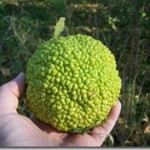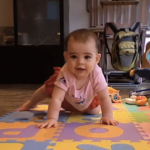- You have the wrong parents. One of the most powerful influences on how efficiently your body burns calories is your genes.
- You’re an adult. It takes a lot of energy to grow up. Once you’re full grown, you won’t burn as many calories while you sleep or sit as you used to.
- You’re 5 foot 2. A tall person, with more body surface area, typically has a more efficient basal metabolic rate (BMR) than a shorter person of equal weight. BMR accounts for 50 to 60 percent of the calories expended every day. Continue reading
Category Archives: Exercise
Horse Apples, Disc Golf and Red Caterpillars
Sure – a brisk walk may be more advantageous than a leisurely one for physical health, but sometimes a leisurely walk is better for mental health. You might even learn things – or at least find something to wonder about.
During a recent trip to Nashville [ask about our new grandbaby!], I often took advantage of a nearby walking trail, part of the Smyrna Greenway System.
One sunny Sunday afternoon five of us decided to hit the trail, which lent itself to what I would call a conversation walk.
I love conversation walks. You’re not just sitting and talking; you feel like you’re accomplishing something. You’re going somewhere, even if when you get there you turn around and come back. It takes little physical energy and even less mental energy.
Walking in a group also give us a chance to wonder out loud.
About Horse Apples, for instance…
 “What are those big green round bumpy things?”
“What are those big green round bumpy things?”
“I think they’re called horse apples.”
“Why do they call them horse apples? Is it because horses eat them?” Continue reading
Shock to the System
Well, it looks like living to 107 is out! A recent blood test indicated that my total cholesterol level is way too high!
Needless to say, I was shocked. I thought I was taking care of myself!
Surely it’s not diet!
I think I eat well: lean beef and/or chicken breast maybe twice a week, no bacon in months, a quarter-cup or so of grated cheese on salads, occasionally indulging in desserts at potlucks, fresh fruits and vegetables always available.
Fried foods? Rare to non-existent in our house. Pasta? It’s been weeks since we’ve eaten either macaroni and cheese or spaghetti, though we’ve had some rice lately.
Maybe it’s genetic.
Diabetes, maybe, but not heart disease. My mother, who admits to being overweight, was diagnosed with high cholesterol in her 70’s, and although he was a paraplegic the last two decades of his life (the result of a high school football accident), my dad’s heart and lungs were still strong into his 80’s.
What to do now?
First thing, see a doctor for a long overdue checkup. We don’t have many choices in this little town, but from what a friend said, I thought Dr. G would not be quick to recommend medication. And I was right. Continue reading
The Power of Play
Ever since listening to Krista Tippett’s interview with Stuart Brown this past Sunday morning, I’ve been observing and thinking about the value of play. Play is not only helpful in the physical, social, emotional and mental development of children, but without play, even adults don’t function as well as we should. According to Mr. Brown, founder of the National Institute for Play,
“[Play] is uniquely and intrinsically rewarding. It generates optimism, seeks out novelty, makes perseverance fun, leads to mastery, gives the immune system a bounce, fosters empathy and promotes a sense of belonging and community. Each of these play by-products are indices of personal health, and their shortage predicts impending health problems and personal fragility.” Continue reading
Want to Age Well? Keep Moving!
Infancy: Grabbing Independence
My son and daughter-in-law have produced a video of their baby girl’s attempts to crawl. She rocks back and forth, happy yet apprehensive, not knowing quite how to start. She tries, falls on her face, gets up and tries again, while her mother holds out her hands in encouragement. [Cute, isn’t she?]
What if she had given up after the 15th or 20th or 30th time she tried? Would she be pulling herself up now, about to walk? Why has she kept on, when each stage is so difficult, sometimes taking weeks or months from when she first tried it? Continue reading



